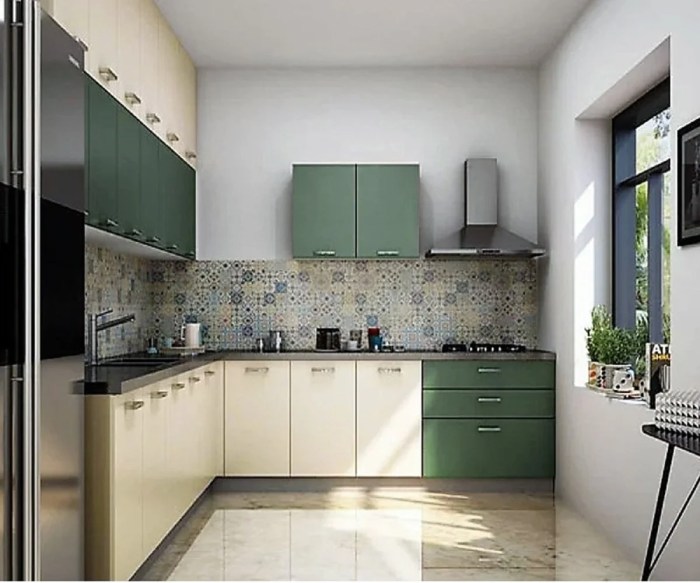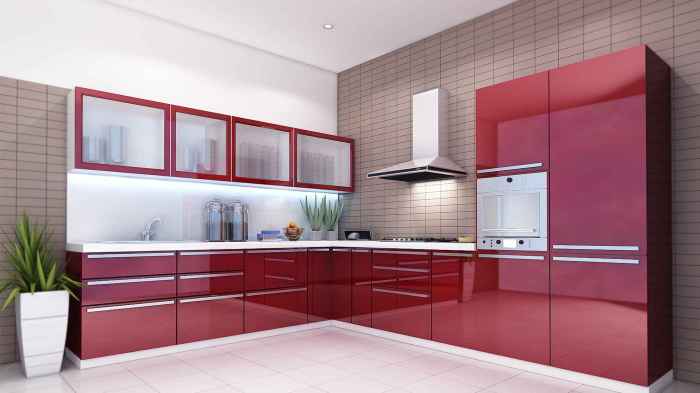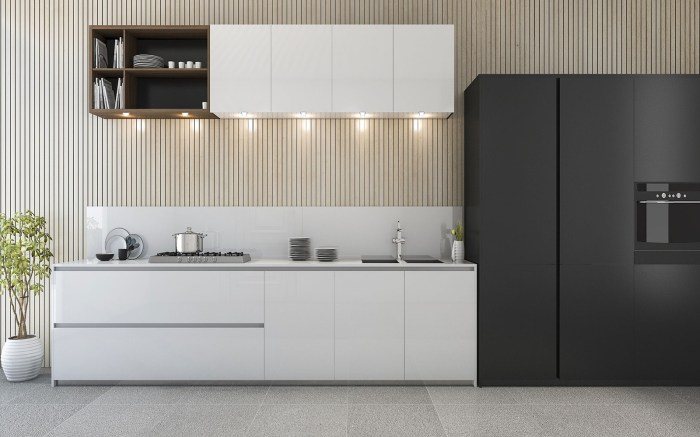Designing a modular kitchen with sustainable materials is a perfect solution for those who want to create a stylish and eco-conscious space. This blog post will provide you with a comprehensive guide to designing a modular kitchen with sustainable materials, including the benefits of using sustainable materials, modular kitchen design principles, and sustainable kitchen appliances and features.
In this blog post, we will discuss the importance of using sustainable materials in modular kitchens and provide examples of eco-friendly materials that are both durable and stylish. We will also share best practices for planning a modular kitchen layout and demonstrate how to create a modular kitchen that meets your specific functional and aesthetic requirements.
Sustainable Materials for Modular Kitchens
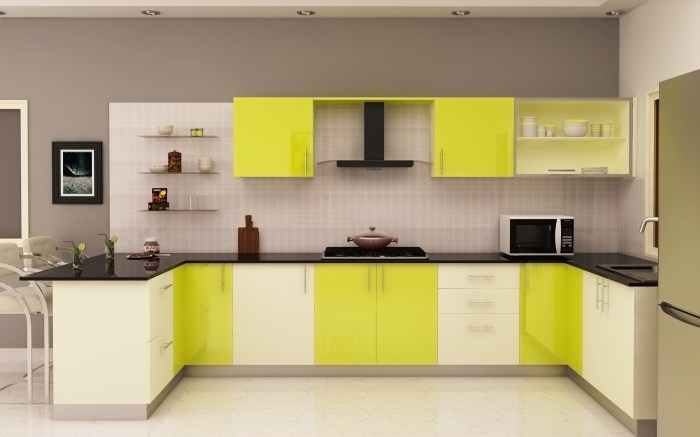
Modular kitchens are gaining popularity due to their versatility, functionality, and sustainability. Using eco-friendly materials in their construction further enhances their environmental credentials.
Sustainable materials offer numerous benefits in modular kitchens. They reduce the environmental impact by minimizing resource consumption, carbon emissions, and waste generation. Additionally, they promote healthier indoor environments by reducing exposure to harmful chemicals.
Bamboo
- Rapidly renewable resource with a short growth cycle.
- Durable and resistant to moisture and pests.
- Can be used for cabinetry, countertops, and flooring.
Recycled Wood
- Diverts wood waste from landfills.
- Can be used to create durable and aesthetically pleasing cabinetry.
- May contain imperfections or variations in color, adding character to the kitchen.
Low-VOC Finishes
- Volatile organic compounds (VOCs) are harmful chemicals released by some finishes.
- Low-VOC finishes minimize indoor air pollution, creating a healthier environment.
li>Examples include water-based paints, stains, and sealants.
Sustainable materials not only benefit the environment but also enhance the durability and longevity of modular kitchens. Bamboo and recycled wood are highly resistant to wear and tear, while low-VOC finishes protect surfaces from damage and fading.
Modular Kitchen Design Principles
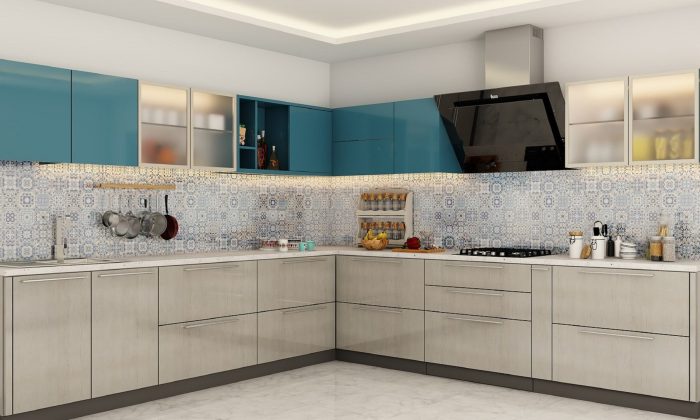
Modular kitchens offer a versatile and efficient approach to kitchen design, providing flexibility, adaptability, and optimal space utilization. By understanding the principles of modular kitchen design, you can create a kitchen that meets your specific needs and preferences.
Planning a Modular Kitchen Layout
Planning a modular kitchen layout involves carefully considering cabinet sizes, appliance placement, and workflow efficiency. Cabinets should be chosen based on the available space and the storage needs of the kitchen. Appliances should be placed strategically to create an efficient workflow, ensuring smooth movement and easy access to essential items.
Creating a Modular Kitchen for Specific Requirements
Modular kitchens can be tailored to meet specific functional and aesthetic requirements. By choosing cabinets and appliances that complement each other, you can create a cohesive and visually appealing kitchen. Additionally, you can incorporate features such as pull-out drawers, corner units, and open shelving to maximize storage and enhance the functionality of the space.
Sustainable Kitchen Appliances and Features
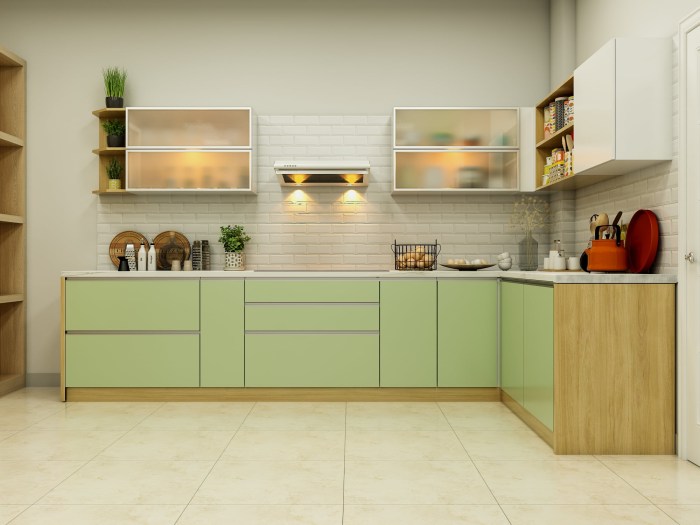
Designing a sustainable kitchen involves not only choosing eco-friendly materials but also incorporating energy-efficient appliances and smart features that reduce the kitchen’s environmental impact.
Energy-efficient appliances, such as refrigerators, dishwashers, and ovens, consume less energy, reducing your carbon footprint. Look for appliances with Energy Star certification, which indicates they meet strict energy efficiency standards.
Smart Kitchen Features
Smart kitchen features can enhance sustainability. Water-saving faucets, for instance, reduce water consumption by aerating the water stream. LED lighting is highly energy-efficient, lasting longer and consuming less energy than traditional bulbs. Motion-activated sensors can automatically turn on lights or appliances when needed, saving energy when the kitchen is unoccupied.
Natural Ventilation and Daylighting
Natural ventilation and daylighting play a crucial role in sustainable kitchen design. Proper ventilation reduces the need for air conditioning, while natural light eliminates the need for artificial lighting during the day. Strategically placed windows and skylights allow for natural air circulation and ample daylight, creating a healthier and more energy-efficient kitchen.
Waste Management and Recycling in Modular Kitchens: Designing A Modular Kitchen With Sustainable Materials
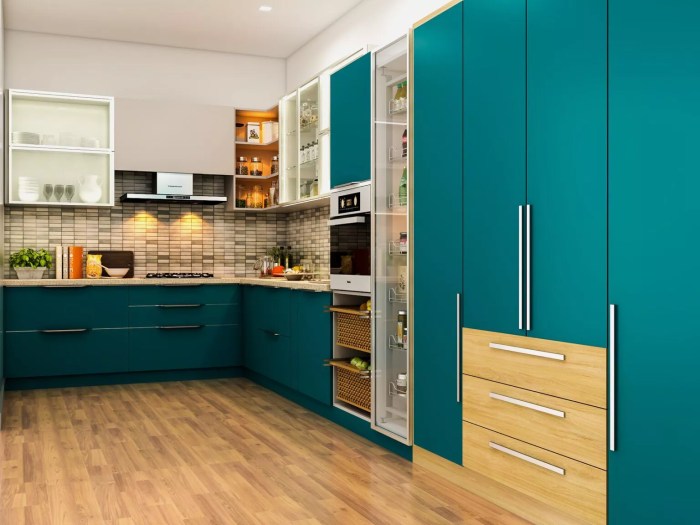
Waste management is crucial in modular kitchens for environmental sustainability and efficient space utilization. By incorporating thoughtful design solutions, you can minimize waste and promote recycling, creating a more eco-friendly and organized kitchen.
Design considerations should include dedicated recycling bins for different materials, such as paper, plastic, glass, and metal. These bins can be conveniently placed under the sink, in pull-out drawers, or in designated areas within the kitchen layout.
Composting Systems
Composting systems are an excellent way to reduce organic waste in modular kitchens. Small-scale compost bins can be integrated into the kitchen island or under the sink, allowing you to easily dispose of food scraps, coffee grounds, and other biodegradable materials.
These systems help divert organic waste from landfills and create nutrient-rich compost for gardening or disposal.
Recyclable and Biodegradable Materials
Choosing materials that are recyclable or biodegradable is essential for sustainable waste management. Opt for kitchen cabinets made from recycled wood or bamboo, and countertops crafted from recycled glass or quartz. These materials minimize environmental impact and can be easily disposed of or recycled at the end of their lifespan.
Case Studies and Examples of Sustainable Modular Kitchens
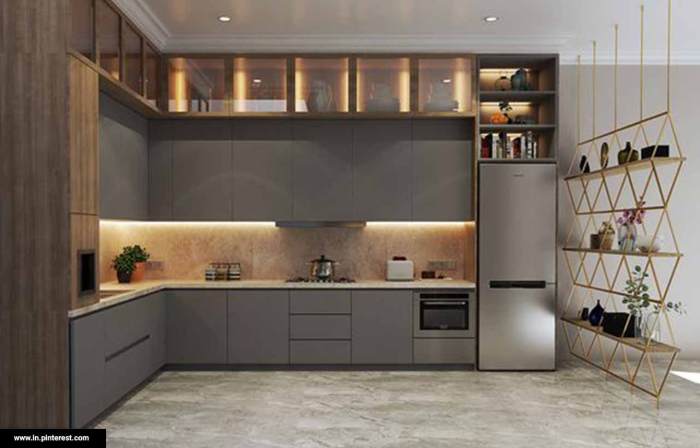
Numerous successful sustainable modular kitchen designs showcase the integration of eco-friendly materials and principles. Here are a few notable case studies:
Case Study: Eco-Kitchen by IKEA
IKEA’s Eco-Kitchen exemplifies sustainability by utilizing recycled materials, energy-efficient appliances, and water-saving fixtures. The kitchen features cabinets made from recycled wood and bamboo, countertops from recycled glass, and LED lighting to minimize energy consumption.
Material Innovations
- Recycled wood and bamboo offer durability and a reduced environmental footprint.
- Recycled glass countertops provide a sleek aesthetic while diverting waste from landfills.
- LED lighting consumes significantly less energy than traditional bulbs, reducing operating costs.
Environmental Impact, Designing a Modular Kitchen with Sustainable Materials
- Reduced carbon footprint due to the use of recycled materials and energy-efficient appliances.
- Conservation of natural resources by diverting waste from landfills.
- Improved indoor air quality due to the elimination of harmful chemicals and emissions.
Case Study: Green Kitchen by Schmidt
Schmidt’s Green Kitchen emphasizes the use of natural materials and sustainable practices. The kitchen incorporates FSC-certified wood, low-VOC finishes, and a water filtration system to reduce environmental impact.
Design Principles
- FSC-certified wood ensures responsible sourcing and minimizes deforestation.
- Low-VOC finishes reduce indoor air pollution and promote a healthier environment.
- Water filtration system purifies tap water, eliminating the need for bottled water and reducing plastic waste.
Best Practices
- Choosing modular designs allows for customization and flexibility, minimizing waste during installation and reconfiguration.
- Investing in high-quality, durable materials ensures longevity and reduces the need for frequent replacements.
- Incorporating energy-efficient appliances and water-saving fixtures reduces operating costs and environmental impact.
Wrap-Up
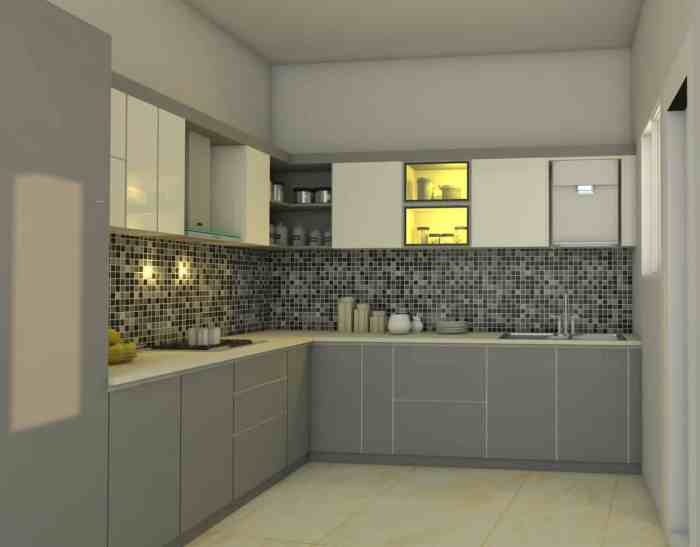
By following the tips and advice in this blog post, you can create a modular kitchen that is both stylish and sustainable. With a little planning and effort, you can create a kitchen that is both beautiful and good for the environment.
Quick FAQs
What are the benefits of using sustainable materials in modular kitchens?
There are many benefits to using sustainable materials in modular kitchens. Sustainable materials are often more durable and long-lasting than traditional materials, and they can help to reduce your environmental impact. Additionally, sustainable materials can help to improve indoor air quality and create a healthier environment for your family.
What are some examples of sustainable materials that can be used in modular kitchens?
There are many different sustainable materials that can be used in modular kitchens. Some popular options include bamboo, recycled wood, and low-VOC finishes. Bamboo is a rapidly renewable resource that is strong and durable. Recycled wood is a great way to reduce waste and create a unique look for your kitchen.
Low-VOC finishes help to improve indoor air quality by reducing the emission of harmful chemicals.
How can I create a modular kitchen that meets my specific functional and aesthetic requirements?
When designing a modular kitchen, it is important to consider your specific functional and aesthetic requirements. Start by thinking about how you use your kitchen and what features are most important to you. Once you have a good understanding of your needs, you can start to choose modular cabinets and appliances that meet those needs.
It is also important to consider the overall style of your kitchen and choose materials and finishes that complement your décor.
